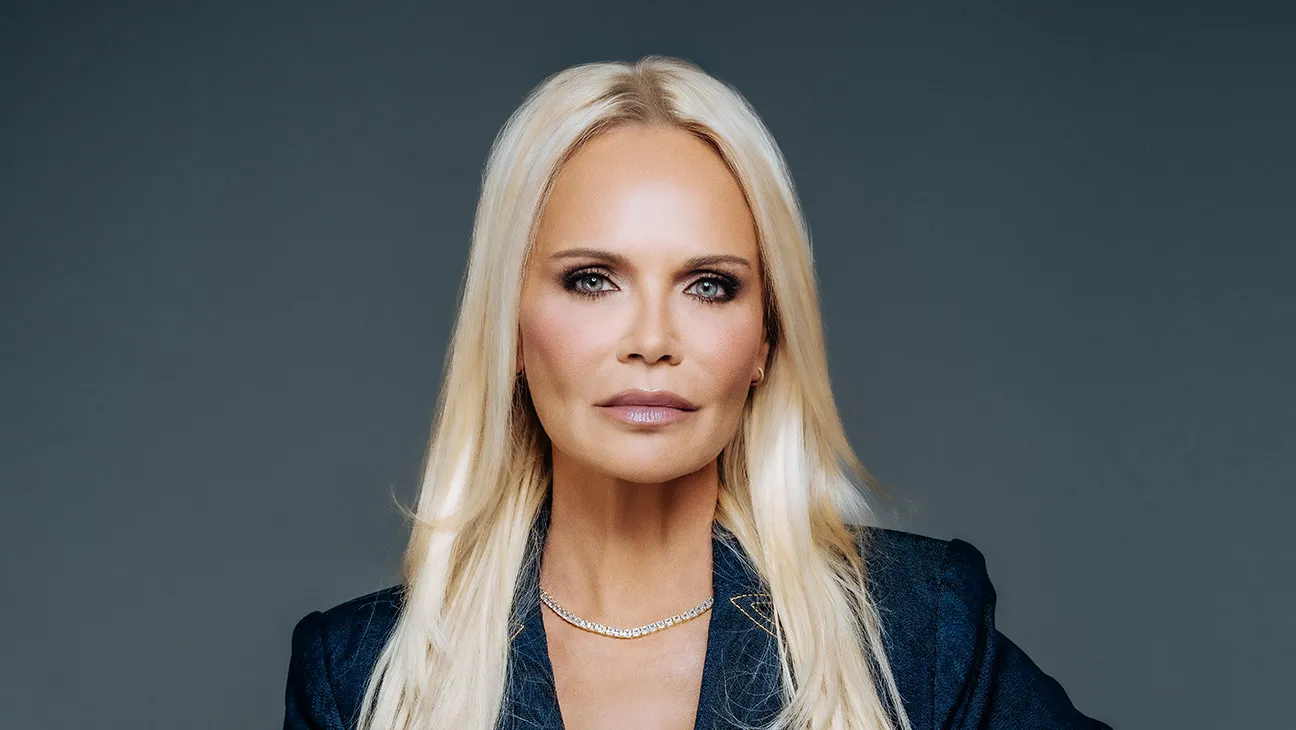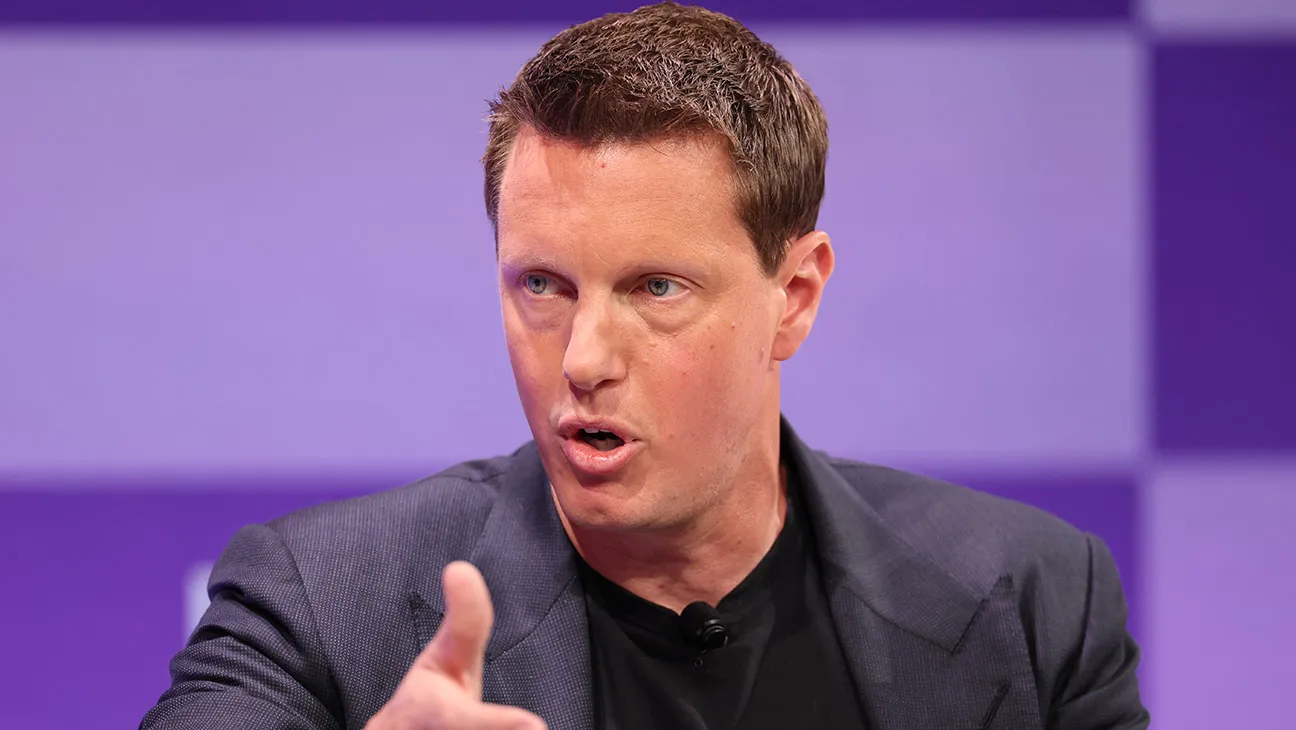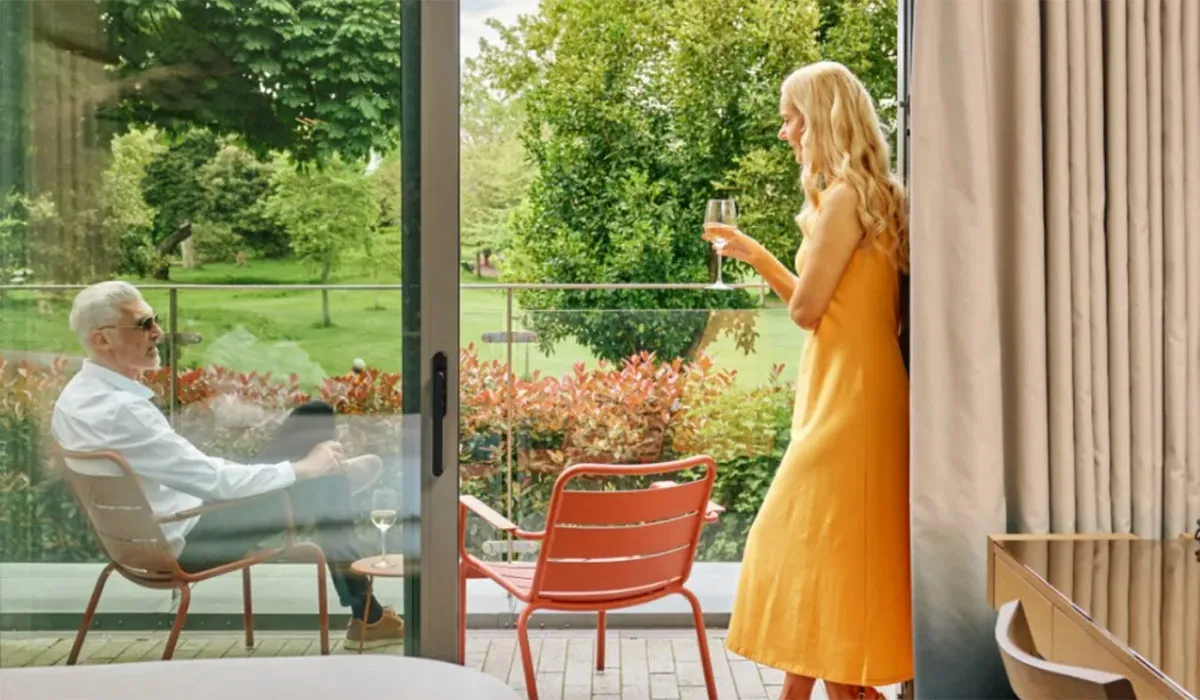Copyright The Hollywood Reporter

This is not the Kristin Chenoweth we think we know — all Glinda bubbles and giggles and good times. This is a different Chenoweth, perhaps closer to the woman that exists offstage, the one that fought her way to the top of the showbiz heap. It’s a steelier Chenoweth, more determined and, yes, maybe a little exhausted. Mounting a new musical will do that to a person — especially when that person is not just its producer but its star and main box-office draw. And this time, her character is far from a good witch. She’s playing shopaholic one-percenter Jackie Siegal — wife of time-share king David Siegel, played by F. Murray Abraham — in a lavish musical adaptation of the 2012 documentary The Queen of Versailles. The music and lyrics are by Stephen Schwartz, the man behind Wicked. To call this Trumpian satire unusual material for a Broadway showcase is an understatement. That it comes in the wake of a rare P.R. headache for the beloved Wicked star only ratchets pre-opening tensions even higher. After right-wing political activist Charlie Kirk was assassinated Sept. 10 at Utah Valley University, Chenowith commented beneath Kirk’s final Instagram post, “I’m. So. Upset. Didn’t always agree but appreciated some perspectives. What a heartbreak..” She signed off with a broken-heart emoji. The statement infuriated some members of the LGBTQ+ community — a sizable segment of her fanbase — for whom Kirk was a loathsome and dangerous figure. An emotional Chenoweth later addressed the backlash on NY1, saying, “I saw what happened [to Kirk] online with my own eyes, and I had a human moment of reflection. … It’s no secret that I’m an advocate for the LGBTQ+ community.” The 4-foot-11 diva, 57, recently joined The Hollywood Reporter via Zoom from her home in Manhattan for a wide-ranging conversation as she prepares to unveil the most challenging project of her career — and just weeks ahead of Wicked: For Good taking flight in cinemas. And while she declines to address the Kirk controversy any further beyond acknowledging that it “almost broke” her, Chenoweth does prove candid about every other aspect of her life, from famous former lovers like Prince and Aaron Sorkin to those whispers of a feud with Wicked co-star Idina Menzel. How many more days to opening night, Kristin? I wish it was tomorrow. It’s Nov. 9, next Sunday. We’ve finally frozen the show, so no more changes. And that’s been a relief. I always say to people, “Just know that [mounting a new musical] is the hardest thing to do, period.” We have the music and it’s so wonderful — Stephen Schwartz has outdone himself. But the plot has to work with the music. Otherwise why sing it? I always tell the young kids that I mentor, “Only sing it if you can’t speak it.” That’s why we sing. But when musical theater is done poorly — and you’ve seen it — it’s all of a sudden the song from nowhere and we’re doing jazz hands. But when it’s done well, just know how hard it was to get to that point. Wasn’t this like a five-year journey for you? Yes. During COVID, Stephen Schwartz called me. He’d been threatening to write another show for me. And I thought, “Sure, that’s sweet. Let’s see if it ever happens.” I was at my mom’s and I think I’d just wrapped [Apple TVs musical satire show] Schmigadoon. I was really tired from the masks and COVID. Remember that? So he and [director] Michael Arden called me and said, “We have your next show: The Queen of Versailles.” I was like, “Oh, French! It’s a period piece.” And they said, “No, it’s about Jackie Siegel. The documentary.” Then they told me the conceit of it. And I thought, “Oh, this is so interesting.” So he played me one of the songs and that was it. What’s the conceit? I will say that we have a French court that comes in and out of our piece. Like a Greek chorus commenting? Yes. And to dramatize how easily the past repeats itself. And what do we do when we have more than enough? It’s easy to fall prey to things where you think, “I would never become that cliche.” The very first time I got a paycheck worth anything, I signed with Paramount for a sitcom, Kristin. And I thought, “I’m going to get me a new car.” And I really wanted a Mercedes. I did not grow up anything near that. My dad went through hard times. It wasn’t a rich kid’s life. This was in Broken Arrow, Oklahoma. Yeah. But with the very first paycheck, I went and got a new two-door Mercedes coupe. I just fell right into the trap. And about six months later, I looked at my daddy and I said, “I thought it would be better. I just thought I’d like it better to have this car.” And he goes, “It’s because money fades. It’s an instant gratification. And then then you want more.” And that’s why I chose to do this piece, for what it’s saying about us — as a country, and where we are at. There are lines we wrote — way before any presidential election — that now are harrowing. Harrowing. And I’m not going to talk about politics, because I’m not a political person. You did endorse Kamala Harris though, right? Yes. And you voted for her? Yes. OK. So you have been public about your politics. Absolutely. Anybody that knows me knows how I believe. But as time has gone on with this piece, it’s art imitating life. I did watch the documentary again. It is a shocking story about obscene wealth. But like you’re saying, it shines a light on a way of life that once seemed fringe and far away, but now seems to have taken center stage. The Siegels are the kind of people that would definitely socialize at Mar-a-Lago. And in fact, the husband mentions knowing Trump several times in the film, well before Trump became president. This is not a world that Broadway musicals would typically delve into. I think people thought it was going to be one thing. And I definitely do the comedy for sure in the beginning, but there’s a very dark turn that happens that the documentary doesn’t even touch upon. Our Act 2 picks up where the documentary left off. So at first it’s funny. But people meet me at the stage door and say, “I can’t believe what a surprise that [tonal] turn was.” I don’t care if you’re left or on the right side of things — it shines a mirror on all of us. We can all see ourselves in it, good, bad, ugly. But just to get back to this idea that you’re also a producer, and this is ostensibly a moneymaking venture, and it’s a very bold thing to do. Broadway is not what it used to be. It’s all safe I.P. and jukebox musicals now. And you’re doing this original, dark piece that’s also delving into the very divisions facing the country right now — wealthy vs. poor, right vs. left — which have never been more heated, as you know. Oh, I know. And I guess there’s a risk that Broadway musical audiences don’t come looking for things like subtlety or nuance, and maybe they won’t even understand that it’s a parody or that you’re criticizing these people. Are you worried that they’ll say, “Oh, you’re starring in a show about people you admire, people that go to Mar-a-Lago?” I’m not worried about it because when they see it, they see it. I mean, there’s online, those people, but I don’t worry about those people. I worry about the people that come to see it. Oh no, it’s not confusing at all. Let me ask you about the recent controversy involving Charlie Kirk. I know that was tough on you. It was tough on me, but I’m not going to answer any questions about it because I dealt with it. It nearly broke me, and that’s all I’m going to say. You probably know my heart, so you probably know. You haven’t done Broadway in a very long time. Ten years. The last time was On the Twentieth Century at the Roundabout Theatre and it was a limited run. Is it because you were turned off by how it’s changed? I know Patti LuPone has complained about what she feels Broadway has become, a sort of garish tourist trap that refuses to take chances. No, I love Broadway. Broadway is my favorite. I am a creature of the theater. But when you come back to Broadway after you’ve done some really cool things, you want to try to make a decision that feels like it’s saying something. I could be over there at Death Becomes Her. But that feels very familiar to me. This role is pretty complicated. Is it true that they pursued you for Death Becomes Her? Oh yeah. I had to make a decision and the decision was a bold one and a brave one. But I’m really happy I made it, because this character is very complicated. I look at famous women roles. Let’s look at Gypsy‘s Mama Rose. I imagine when that came out in 1959, people were like, “Geez, she’s the worst.” But look — we’re still watching her. We want to see who’s going to put their stamp on it. Most recently it was Audra McDonald. I don’t know if Jackie Siegel will become that kind of part, but you can kind of see, if not the comparison, why I would want to play it more. And we don’t have Stephen Sondheim anymore, but look at what he wrote about. Presidential assassins and all this dark stuff. Yes. And Stephen Schwartz’s score on this one — I think he might be trying to murder me. I have to hit a high C, soprano legit, and then I go down into midrange and then belting. So I don’t usually speak during the day. But I’ve got Stephen Schwartz alive and working at the top of his game. You mentioned that he brought this to you. Did he bring Wicked to you as well? I was doing the sitcom Kristin and he called me about Wicked and said, “It’s just one song. I’ve got your voice in my head singing it.” I didn’t know him very well. He saw me in Steel Pier. He said, “Just come over and let me play it for you.” So I went over to his apartment in L.A., he played me “Popular,” and I said, “Oh, that’s cute.” And I had just won the Tony for You’re a Good Man, Charlie Brown. But I go, “I’m doing this TV show and I just don’t know.” He goes, “Just do the reading.” So I did the reading. It was just Act 1 at that point and Marc Platt was the producer. He was there. In the original story, it was all about Elphaba — Glinda came on and was her friend and then went away. I thought, “This is perfect. I can go on, score with ‘Popular’ and do something really funny, and then I can leave and go take my bow.” At the second reading, Stephen Schwartz has more music for Glinda. The third reading, it’s Glinda and Elphaba. And it just evolved and evolved and evolved and evolved into what you see today. So I’m really glad that Stephen had me in his head. And when he said, “Versailles is your next show. Kristin, you’re doing it,” I’m not going to say no. You have to trust his instincts. He gives me great notes. And he’s at rehearsal every day. And he’s got this Wicked: For Good coming out on Nov. 21. He’s my inspiration. Are you going to make another appearance in the Wicked movie sequel? I don’t know if I’m allowed to talk about that. I don’t think it hurts to say no, I’m not. I think we kind of did our thing and passed the broom and wand, so to speak. But I can’t wait to see it. I kind of know a lot about it from my girl, so I just can’t wait. Meaning Ariana Grande. Yeah. Over the years, I’ve heard rumors that you and your Wicked co-star Idina Menzel did not get along. Is that true? We are so different in the way we do our process that of course rumors are going to fly, right? She and I, only we know what we went through to get to where we were. We would die for each other. So it’s like sisters. Are sisters always perfect? So it’s family. That’s the best way I can describe it. If I recall, Wicked did not get good reviews when it opened. It actually got trashed. Yeah, it did. So I suppose that’s a good lesson to keep in mind as you unveil a new show. Although I’ve read some very good reviews already from the Boston tryouts of Versailles. But how seriously do you take these reviews? How long did it take before you realized, “Oh my God, Wicked is actually going to be around for the rest of time”? I knew it when we opened in San Francisco. I knew it. I remember talking to Idina after opening night in New York. It was a sad day. She goes, “We should have gotten good reviews.” I go, “No. It doesn’t matter. You are the green girl who flies at the end of Act 1. I come down in a bubble. We sing ‘For Good.’ And the people have spoken.” I wanted the good reviews for our show, but I knew it wasn’t going to matter because I heard the audience. Now, Queen of Versailles couldn’t be more different from Wicked. It’s not like at the end there’s a pretty, big bow and these are characters that you’ve known your whole life. If I’m a critic now, I don’t know. I dare say I just think it’s a very topical piece. People will have things to say about it, whether they’re good or bad. How important are reviews? You tell me. It used to be like the New York Times could make or break a show, but I don’t think that’s the case anymore. But now you have a lot more of these bulletin boards and audiences weighing in online and forming a consensus. I like the online presence, but I also want to make sure that they’re actually at the show. That’s something that scares me a little bit about not just theater, but people giving any opinions about any business. Are they there? Did they eat the hamburger? Had they gone to the clothing store? On Yelp, it’s always like, “I had the worst fight with my husband here so I’m giving the restaurant zero stars.” Right? So I just hope that people that are critical or have anything to say about our show, both bad or good, actually come. That’s what I care about. The New York Times for me has always been among the top 10 places that you would like to get a good review. I don’t know anymore. I feel like the business has changed so much, even in the 10 years since I’ve been away. You’ve had some amazing career chapters that Wicked seems to have overshadowed. One is your two-season stint playing press secretary Annabeth Schott on The West Wing. It was supposed to be a few episodes and it turned into two years. It was some of the happiest times of my life, because of the cast and the writing and getting to work at that level with the best in the business. And also the political views — how I wish it was like that now. I got very close to John Spencer [who played White House chief of staff Leo McGarry and died in 2005]. I mean to sit down every week at a table read and get gold… Gold from Aaron Sorkin. Not when I worked there. I worked there under John Wells. Aaron Sorkin had wanted me for the show, but I chose to do Wicked instead. He had written me a fan letter and it was a beautiful relationship. We dated on and off over the years. Aaron and I have had a wonderful relationship over the years, and by the time I hit West Wing, he was very much out. I just assumed Aaron had cast you. I hadn’t even met Aaron. Then when I got the show, he sent me flowers and said, “Just my luck. I’m not on the show anymore, but you are.” And he asked me out on a date. What did you have in common with him? Respect, I think, for what each other does. I sense a theme, which is that you become a muse to these very brilliant creative men, and they call for you. Because that’s also what Prince did. Prince. Yeah. Just two evenings. The first night, I didn’t know it was a date. But you figured it out by the second night, I assume. I figured it out the first time. You kind of can’t believe you’re in the presence of that. I think Prince was put in my life as an encourager, because he said, “I want to show you something.” We went into his movie room and he played this aria that I did with Great Performances from Candide. Which I just watched. It’s unbelievable. First of all, your voice. Where did that come from? I don’t know. I was adopted. My biological daddy was a musician, and so it makes sense, but he was more country-rock and rockabilly. But I definitely got the music from my biological family. So Prince somehow was watching Candide, which I can’t imagine. I don’t know how he found it. But that’s the interesting dichotomy about who Prince was. He was classically inclined. He had his finger on the pulse of everyone. And when he played it, I said, “I’m not going to watch this with you.” And he said, “Yes, you are. I want you to see how wonderful you are.” It was like an angel had appeared. He wanted to encourage me. And then what happened the second night? Well, I had gotten nominated for an Emmy and lost, and he said, “Invite all your friends. I’m going to do a concert in your honor tonight.” It sounds like he really liked you. And I couldn’t understand it. I couldn’t. It’s Prince. Look, I’ve had wonderful men in my life, but to finally find the one [in my husband since 2003, Josh Bryant], is another thing entirely. He’s an amazing musician himself. He’s not bad to look at. But we just have similar hearts. I realized you date so that you can eventually find somebody that’s like-minded, has a similar heart. It just happened for me later in life, that’s all. Plus my focus for so many years was on my child, which was my career, and now I have somebody to share it with. I’m glad you found him. You deserve it. You belong on the Mount Rushmore of Broadway. Thank you, baby.



